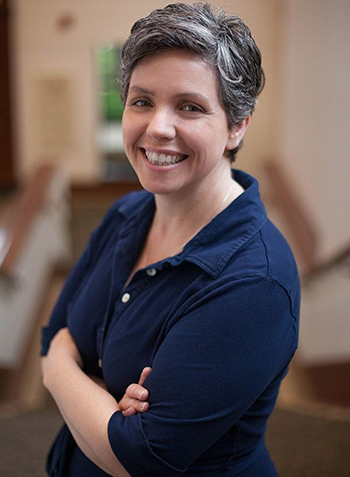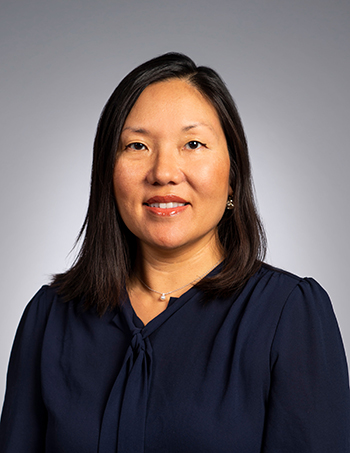Published on
Updated on
The theme of this newsletter is professional development opportunities for faculty, so we are highlighting a staff member who helps design many of these programs and a faculty member who has personal experience in two different faculty cohorts. Both the Provost’s Office and the Office of Research, Innovation and Impact have programs and staff to help faculty connect with the resources they need at all phases of their careers.

Christie Terry, Director of Professional Development, Office of Research, Innovation & Impact; Educational Program Director, The Connector
Christie Terry facilitates or co-facilitates several faculty development programs:
- Early Career Research Development Fellows Program (3-year program)
- Mid-Career Research Development Program (2-year program) in collaboration with Candace Kuby from the Office of the Provost
- Arts & Humanities Research & Creative Works Fellows Program (2-year program) in collaboration with Candace Kuby from the Office of the Provost
- NSF CAREER Club (7 months) focused on helping faculty prepare an NSF CAREER proposal
Terry’s role is to plan and facilitate the meetings with the various cohorts as well as to connect faculty members to resources for everything from planning grant proposals to mentoring, depending on what their goals are. “We are focused on helping fellows achieve their research and creative works goals and to broadly support their success at Mizzou,” she said.
Terry also assists other cohort leaders in selecting participants when submissions are open for a new group of applicants.
“We try to shape the programming for each cohort based on their expressed needs,” Terry said. “We are looking for faculty who have goals for their program participation and growth as scholars. When they can articulate in their application the types of support they hope to get and the projects they would like to work on, it is more likely we can plan to meet those needs.”
In addition to the specific criteria for each cohort, what they are looking for are faculty members who are willing and able to commit the time to the meetings each month and engage in the program. It is helpful for faculty to also have the support of the dean or chair to encourage participation.
Who should apply for the cohorts and how do you know if a program is right for you?
“Don’t worry about whether or not you are a ‘fit’ for the program,” Terry said. “ If you are selected, we will work on making the program a fit for you.”
Faculty may apply to programs for different reasons.
“Some folks want to use the program to re-focus and re-prioritize, others want to grow their network or get better at funding their research, while still others want to expand their network and feel more ‘plugged-in’ to the Mizzou research community,” Terry said.
What all the cohorts have in common is they connect researchers with appropriate resources, assist with research development and help members find a balance between teaching, research and other aspects of their careers.

Lynn Itagaki, Associate Professor of English and Women’s and Gender Studies
Lynn Itagaki is currently a member of the Arts & Humanities Research & Creative Works Fellows Program, a 2-year program that began in 2022. She also previously served in the Mid-Career Research Development Program. Speaking about the benefits of that cohort, Itagaki said it assisted her with searching for funding opportunities that are available in the humanities.
“It’s helpful in deciphering how our research appears to potential external collaborators and funders and if this evaluation aligns with our own perception of our research,” she said.
Her goal with the Arts & Humanities cohort is to use the funding resources and time to finish her next book, begin a co-authored book project and apply for the Fulbright and NEH external awards. Participants in the cohort receive a stipend for a course release and/or other research and creative works support needs. Participants have access to an external mentor, spaces for writing retreats, support for grant writing, and panels and discussion forums on topics pertinent to arts and humanities scholars.
For faculty considering applying for one of the cohorts, the advice she would give is to consider your personal research and career goals and what solutions the programs can provide. For her, it was allowing her time and funding to complete her book. Staff in both the Provost’s Office and Research, Innovation & Impact can assist with any overcoming obstacles.
“The fellows, whether Early Career, Mid-Career, or Arts and Humanities serve as in-house focus groups, so come with your ideas and how you might spread what you’ve learned to campus constituencies and beyond,” Itagaki said. “Since the latter programs are more recent, the organizers are truly invested in wanting to modify the monthly meetings and resources offered to help us succeed and closely listen to our individual ideas and needs that might be scaled to work for the whole group or even the college-wide faculty.”
The groups also represent different research areas at the university, so it is helpful to get to know the cohort members’ research processes and structure so you can apply it to your own discipline.
“I appreciate learning how other disciplines solve research problems and if some of their best practices can apply to the humanities and/or the interdisciplinary research I’m initiating,” she said.
The cohorts may even lead to better collaboration across colleges and disciplines.
“Because I was trained as a literary scholar, in which most of my research is single-authored and fellowships and grants have one sole investigator rather than a research team that hires staff and funds student research stipends, I was interested in learning how larger-scale collaboration might work, especially as I engage in more interdisciplinary research that might involve quantitative methods or perhaps pursue a digital humanities collaborative grant in the future,” Itagaki said.
For more information on applying for a faculty development cohort, see the specific programs under Faculty Development on the Provost’s website or the Research, Impact & Innovation website. Applications for the next cohort of Mid-Career Research Development fellows will be available in November 2022. Applications will stay open through December, and selections will be made in January 2023. This cohort is open to tenured faculty who have not yet been promoted to full professor.